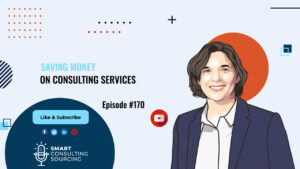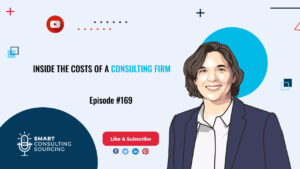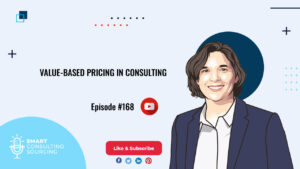Hello and welcome to episode 69 of our podcast: Smart Consulting Sourcing, THE podcast about Consulting Procurement.
My name is Hélène, and I’ll be your host today.
Each week I’ll give you the keys to better use, manage and source consulting services.
In Last week’s episode, I talked about how to work with consultants.
And we saw that you should manage the consulting project as you manage any other project. Keep control of the deliverables, the change, and the conclusion of your project. Fix the problems when you can and terminate the project if you must. And don’t forget to anticipate the transition after the Consultant leaves.
But this week, I wanted to focus on the relationships you have with your consulting suppliers.
How do you build and maintain good relationships with your consulting suppliers? There is no magic recipe, but here are a few tips that might help:
So my first tip is to Identify your Strategic Consulting Suppliers
Like for any other category, Supplier Relationship Management (SRM) is a Huge Topic for Consulting Services. The way Procurement manages Consulting Providers should fit in the overall SRM practices for the company.
The principles for segmenting the entire supply base for Consulting Services should be the same for other categories as well. Often companies will choose the largest Consulting Firms as strategic consulting suppliers because they capture most of their spend. But the spend should not be the only criterion.
So what is a strategic consulting supplier? It could be a supplier with a unique strategic skill, a supplier working on strategic projects, or projects with a significant impact on the company.
The second tip is to qualify your consulting Suppliers
Suppliers, even for Consulting Services, need to be qualified. The requirements for these consulting suppliers are mainly based on former clients’ testimonies, case studies, and relevant thought leadership.
You have two things to consider:
First, the references must be relevant to the scope of your qualification. Let’s imagine you want to qualify John Doe Consulting for Innovation Management projects. They need to give you references for the Innovation Management capability, or at least the Innovation capability.
Second, don’t forget that Consulting has a very high human component. The partners or project managers have a significant impact on a project. Still, that impact relies mostly on intrapersonal skills and expertise. And that’s not transferable.
The partner who is initiating the relationship will often be the owner of the account and will be in charge of most projects. Ask for references of projects s/he led personally.
When you invite a Consulting Firm on a new capability, don’t hesitate to ask for further relevant references. And if the references are with your competitors, do not hesitate to ask a third party to help you with the process.
Tip #3: Measure their Performance
Very few Companies measure the Performance of their Consulting Suppliers. Mainly because Consulting is an intangible service, and they are not comfortable evaluating the content of a project.
We will get back to implementing a Performance Measurement System in detail in a further podcast, but here is a sneak peek.
The system should be based on what makes a Consulting Project successful. Top of mind, you will find the quality of delivery with the time/quality/cost aspects. It is difficult to measure the impact of the Consulting Team on the Business in numbers. But it can always be estimated with the sponsor’s satisfaction and the project leader on the results.
Other elements contributing to the success of the project are the talent and expertise of the team and the soft aspects (ability to build trust or transfer knowledge, for instance).
The granularity of the measurement can vary depending on the level of precision you expect. However, you will probably want to interpret and compare results. In that case, it is recommended to be as exhaustive as possible.
Here comes tip #4: Implement Supplier Improvement Plans
The relations with the consulting Suppliers should support continuous improvement. When a problem is observed during a project with a Strategic or Preferred Supplier, very often captured through the Performance Assessment, you need to implement an improvement plan.
Don’t hesitate to give a chance to the supplier to provide you with some feedback on the scoping and the management of a Consulting Project.
Tip #5: a bit Captain Obvious: manage the relationship
The intimacy between a Consulting Firm and its clients can facilitate and accelerate projects. When you regularly work with Consultants, they are “plug-and-play” if you will: they know your Business and industry. So put in place regular meetings with your Strategic and Preferred Consulting Suppliers to keep them in the loop and communicate the results of their Performance Assessments.
Implementing Category Management for the Consulting Category can drive significant savings and increase in the return of investment of your Consulting projects. It implies a close cross-functional collaboration for all categories, which can be challenging in a large organization.
The nature of Consulting Services demands an even more collaborative and flexible approach to category management. Because the decision-making authority and the knowledge are in the hands of the sponsor and the project leader.
And my final tip: leverage Consultants’ insights
After spending a long time working on projects with you, consulting firms start to acquire a good degree of familiarity with your Business. Obviously, they would love nothing more than having another project with you (unless you have been a painful client, but that is another story).
Ask your consultants for feedback about your company and what they would do if they were in your shoes. You will be surprised by the power of this simple question. In doing so, you will usually get in record time honest feedback about your operations as compared to the state of the industry or the latest thought leadership.
In conclusion
Managing the relationships with consulting suppliers has many advantages from a procurement perspective. You will need to identify your strategic suppliers and qualify your panel.
But then you can start measuring the performance and building improvement plans. And consultants that you work with on a regular basis will better know your business, your industry, your culture, and your organization. And that can be very valuable to you.
And that marks this end of our podcast, folks. Next week we’ll be talking about demand management for your consulting services and how it can help with creating more value if done right! What are the best practices to implement to keep your consulting expenses under control? And what pitfalls might you encounter?
Till then, stay safe and happy sourcing!
Don’t forget to follow me on Linkedin, Twitter, and Facebook if you enjoyed this podcast. I regularly publish on the topic.
If you have other questions about how to manage the relationships with consulting suppliers, remember you can contact me directly on Linkedin or by email at helene.laffitte@consultingquest.com. Because I am always game for a chat!
If you want more episodes or read the transcript of this podcast, you can find them on consulting.wiki or our Youtube channel.
You can also have a look at our website consultingquest.com to know more about our book, our publications, and our services to improve your consulting sourcing.
Bye and see you next week! Au revoir!







